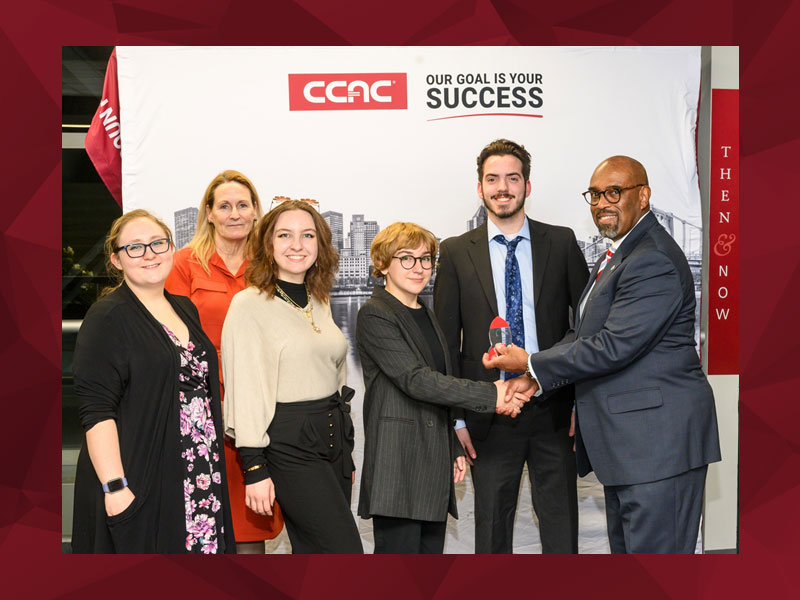CCAC Student Experiment Begins Journey To Outer Space

Pictured from left to right: Patricia Donehue (CCAC Faculty mentor); Anne Duffy (CCAC Faculty mentor);Faith Dunn, CCAC Student & SSEP Team member; Maya Burns, CCAC Student & SSEP Team member; Connor McDonagh, CCAC Student & SSEP Team member; and Dr. Quintin Bullock, CCAC President
A research experiment created by a team of students from CCAC began a journey into space this month (Monday, Nov. 4 at 9:29 p.m.). The Space-X rocket launched from Cape Canaveral with a payload of experiments, including one from CCAC. The experiment will be conducted by astronauts at the International Space Station and the research results will be sent back to earth.
CCAC students Maya Burns, Faith Dunn and Connor McDonagh submitted their winning experiment, titled “The Effect of Microgravity on the Enzymatic Degradation of Polyurethane by Penicillium chrysogenum,*” as part of the international 2023 Student Spaceflight Experiments competition. This experiment will test how microgravity affects the fungus Penicillium chrysogenum’s biodegradative enzymes ability to degrade a sample of polyester-polyurethane. This information can be used to facilitate the transition to circular production/waste economies, both on Earth and in space exploration.
Sponsored by the National Center for Earth and Space Science Education (NCESSE) in the U.S. and by the Arthur C. Clark Institute for Space Education internationally, the Student Spaceflight Experiments Program (SSEP) invites students from selected colleges, universities, school districts and organizations worldwide to develop research experiments to promote space education.
Teams of CCAC students from various academic disciplines competed in fall 2023 to design and present unique microgravity experiments, one of which would eventually be selected to be sent to the International Space Station. In late November 2023, a national review board assembled by the NCESSE selected the winning CCAC project, which traveled this month to the International Space Station.
Under the leadership of Dr. Justin Starr, CCAC Endowed Professor of Advanced Technologies, the college has been participating in the SSEP competitions since 2022. CCAC is the only college to be selected by the prestigious sponsoring organizations three years in a row. The 2023 Mission 18 team experiment is the second one to travel to space, following the successful launch and return of the CCAC Mission 17 research last year. The 2024 semifinalist competition is underway, with 18 CCAC student teams submitting research projects for consideration by the first round’s local panel of judges.
